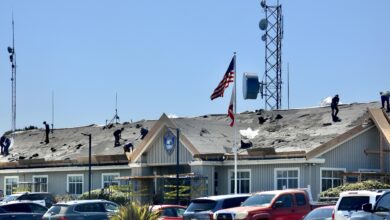FBUSD hires firm to see if developer fee hike possible
The Fort Bragg Unified School District voted to study developer fees, which could lead to higher costs for those building a home or remodeling.
Revenue is down for the district, along with the number of sales of homes in the local real estate market.
Superintendent Steve Lund said the district had been getting about $200,000 per year but has only garnered $54,000 this year.
“This really isn”t a surprise with the loan issues the whole nation has been struggling with,” Lund said.
The residential developer fee is currently $2.24 per square foot and commercial is $.36 per square foot. The current developer fees would add $3,360 to the cost of building a 1,500-square-foot house.
The study is just the first step in the process. The board will decide once the study is complete whether a rate increase is justified or desired. The study shows how much new development costs the schools in terms of student bodies.
“It is possible the study could show we cannot even charge the fees we are already charging ? usually it does because of escalation of costs, and prevailing wage and such,” Lund said.
The state allows school districts to raise their developer fees every two years. The last time the board raised the rates was in 2004, when the real estate market was at its peak. The White Property, a plan for developing more than 100 homes north of Fort Bragg, and the Georgia Pacific mill site both seemed on the verge of development. But the White Property project has been withdrawn, pollution was discovered on the mill site, and a new city council was elected since then, not to mention the popping of the real estate bubble.
Board members asked that the last study be unearthed to help everyone understand how all those factors could impact the notion of a rate hike.
Lund explained the rates must be justified by a look at the cost of construction, future projected growth and the number of students each home could generate.
He said retirees who complain about school development fees when they move to the Mendocino Coast miss the point that the fees are intended to cover the number of students that home may produce over a 20- to 30-year period.
He said he has advised the board to take advantage of the rate hikes, as the only way the board can generate needed money.
“The board in the past has made decisions not to levy the higher fee,” he said.
Developer fees originated in the 1980s, as local governments sought to pay the bills after Proposition 13. The fees are seen by critics as a way for the state to balance its budget without raising taxes, passing that buck collection to local governments.
“The state pushes the responsibility down to the local level,” Lund told the board.
Trustee Jennifer Owen said the board has not charged the maximum in years past out of concern for the cost to first-time home owners who want to build.
But she said the board”s primary obligation is to the students and staff of the district.
Lund said it would be a good idea to do the study even if there is no motivation to raise the fees.
“Mister attorney, you will understand this,” said Lund, addressing new board member, attorney Ryan Perkins.
“We never know when or if a developer will challenge the fee,” Lund said.
The study will cost between $4,300 and $6,000.
The board voted unanimously to pay to do the study, which will be returned for discussion at a future meeting.




